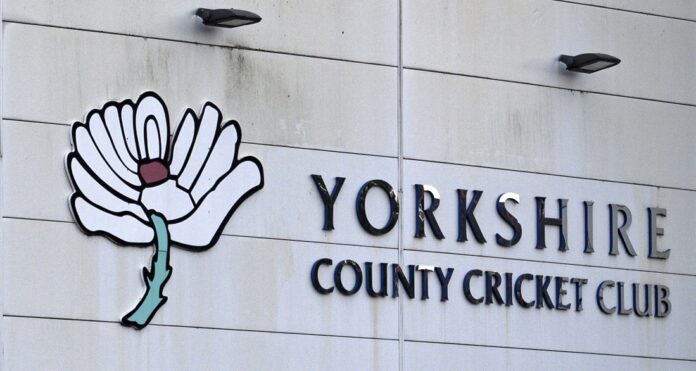Both during and after listening to the Parliamentary Select Committee hearing in London on Nov. 16, I felt a profound sense of loss.
The hearing was called to address concerns about the lack of action taken by Yorkshire County Cricket Club following the results of an internal investigation which found a former player, Azeem Rafiq, to have been the victim of racial harassment and bullying.
On one level, there was Rafiq’s loss of a cricketing career, of a son, of personal and family time given over to challenging the injustices to which he and others of a particular race and color had been subjected. The perpetrators were colleagues and employees of YCCC and beyond.
On another level, there is the further loss of romantic notions of cricket, of deterioration in the application of the spirit of cricket and a loss of respect for the game by those who do not engage with it.
Cricket has long been a vehicle for people who saw opportunities to either make money or social capital by embedding (British) imperialist ambitions within its structures.
Simmering inside these structures were racial undercurrents, which have burst forth on occasions. In 1968, the selection by England of a non-white South African cricketer to play against South Africa in that country caused a major political controversy. The use of intemperate language towards a dominant West Indies team in 1976 was inflammatory, but the idea that cricket might harbour systemic racism was considered fanciful. After all, cricketers of different colors played in the same teams, especially in England.
A well-respected former captain of England is of the view that we all have touches of racism within us, that much of it is unconscious and often used to protect privileged positions. In cricket, many privileged positions have been carved out during the last three centuries. Yorkshire’s privilege and the challenge to it reveals a third layer of loss — that of the ability to put in place appropriate, adequate governance systems to prevent abuse.
During the hearing, the committee’s chair, a man possessed of a coruscating tongue, turned his attention to the financial cleft that exists at YCCC. As previously reported, the club was rescued in 2002 from financial implosion by a wealthy Yorkshireman. He became its CEO and then executive chair before moving onto be chair of the English and Wales Cricket Board between 2015 and 2020. YCCC is indebted to the former chairman’s family trusts for almost GBP15 million ($19.98 million).
In his testimony, YCCC’s recently resigned chair, who had no executive powers, revealed that he had wished to remove two, possibly, three, executive directors. His wish was based on their failure to accept the gravity of the situation, to apologize and to implement the investigation’s recommendations. He was unable to do so because YCCC is beholden to the family trusts for approval and removal of YCCC directors.
Whilst it is understandable that the trusts seek to protect their interests, an arrangement whereby they influence the appointment of both executive and non-executive directors, who are supposed to be a safeguard against the executive acting in their own self-interest, is likely to curtail independence. Tensions in the arrangement were illustrated when an executive director reportedly asked the non-executive chairman to call off the investigation.
As has been shown by the evidence revealed during the committee’s hearing and subsequent fallout from it, YCCC would appear to have much to want to hide in terms of the use of racist language and behavior by some of its employees towards colleagues. Others are protective, arguing that such language and behavior was not intended to be hurtful, being part and parcel of dressing-room and team “banter.”
Some committee members widened the line of questioning beyond Yorkshire, to explore if the environment described at YCCC is typical of the English professional game. Rafiq seemed to think so. A newly established Independent Commission for Equity in Cricket has called for evidence of racism in the game. The ECB representatives at the hearing appeared to be surprised at suggestions that use of racist language and connotations might be found elsewhere on the circuit. It should not be a surprise.
In a 1999 survey, the ECB’s Racism Study Group found that 58 percent of all those questioned, and at least 70 percent of Black and Asian respondents, believed racism to exist in the game. In club cricket, I have heard racist terminology used. The ECB has had at least 20 years to put effective measures in place to address the issue. Yet, measures are not enough; an effective and committed program of cultural and social change must run alongside.
Analysis of the composition of ECB’s Board since its formation in 1997 would reveal it to be largely white and, until relatively recently, male. At the hearing, its CEO intimated at a struggle to get the first-class game to wake up on issues of race, equity and diversity. The ECB has a regulatory responsibility. It may be reasonably assumed that this should be applied not just to the recreational game but the professional one. Over 20 years, at least, it seems that racism in the English professional game has been tolerated and/or ignored.
Now that the floodgates are open, a welter of measures and promises have been made to address and eliminate racism in the sport, led by the ECB, under pressure from government. Rafiq has laid bare racism in Yorkshire, and raised the likelihood of more widespread racism in the English game. It has provided a worldwide opportunity for others to speak out if this is a uniquely English problem — which seems unlikely — and is providing an opportunity for authorities to re-examine privileged positions. The extent to which they achieve this will determine the future morality of the game and how much respect and spirit it will leak.

